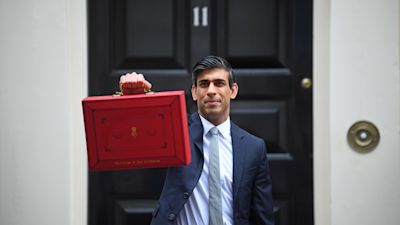Budget 2021: Pressure on Welsh Government to match Sunak's post-pandemic pledges

All budgets are political and serve more than one purpose but today's is a Swiss-army knife of a budget.
It aims to continue the emergency spending plans helping people and businesses through the Covid pandemic, as well as beginning the process of recovery and the painful process of paying for that recovery.
At the same time it's ultra-political, designed not just to wrong-foot the Conservative party's opponents in Westminster, but also to consolidate the still-uncertain support Boris Johnson won in former 'red wall' seats including in Wales.
It sets out a trajectory that the Chancellor hopes will see his party (possibly led by him?) back into Downing Street in 2024 and it's supposed to help Conservatives fighting elections here in Wales and in Scotland.
Oh and it's meant to stop the United Kingdom breaking apart.
So the Chancellor made much of the money he is committing to be Wales to be spent by both his government and Mark Drakeford's.
The headline figure is £740m - that's the amount extra the Treasury says the Welsh Government will get as a result of commitments for England announced today such as help for homebuyers.
Welsh ministers are cynical about such headline figures. They say they often mask amounts taken away elsewhere.
However, taken at face value that's a significant boost to the Welsh Government's spending power beyond the £5.8bn extra during the last year to pay for handling the pandemic.
The Treasury says there'll be an extra £1.5bn in 2021/22 for the Welsh Government which already has £650m that it can carry over into the next financial year.
All of that is on top of the £12.8bn for day to day spending and £2.4bn capital given to the Welsh Government for 202/21 and the Welsh tax revenue that the Welsh Government collects.
Welsh ministers decide how that money is spent and they have no obligation to match the plans announced by the Chancellor but there will now be pressure on them to do just that - or explain why not.
Finance Minister Rebecca Evans told ITV Wales that the Welsh Government will be giving a full 12 month rate relief to leisure, tourism, retail and hospitality businesses with a rateable value under £500,000 until the end of the year.
Will Welsh homebuyers see similar incentives in terms of stamp duty? Here in Wales the threshold hasn't been lifted quite as much reflecting, says the Welsh Government, lower house prices here.
Those are two examples of a political dilemma for Welsh ministers: follow suit exactly and risk not gaining any credit for it, or do something different and be criticised for that.
And with an election here looming, political calculations become even more significant.
Then there's the union of the United Kingdom. Unsurprisingly, much of the focus is on Scotland, because there, support for independence has grown in a way that could see it become a reality if the SNP wins enough votes in May.
When it comes to Wales, Boris Johnson's government has practiced an aggressive unionism, acquiring new powers which would enable it to spend in areas previously considered wholly devolved and taking every opportunity to provoke anger and enthusiasm in equal measure by promising to build an M4 relief road.
It's reported that with the collapse of Number 10's Union Unit that approach is being replaced by 'love-bombing' which may be behind the funding trumpeted by the Chancellor for Growth and City Deals, a Holyhead Hydrogen Hub and a Centre for Rail Excellence in Neath Port Talbot.
All these are more accepted means of UK Government direct spending in Wales. I wouldn't write off claims around the M4 just yet though.
A quick word on free ports. Eight of these low-tax, high-investment, light-regulation zones have been announced in England, none in Wales, Scotland and Northern Ireland.
UK Government ministers have repeatedly pledged to create at least one in each of the devolved nations. But there's some doubt about that ever becoming a reality here in Wales where ministers see each of the English ports getting £25m seed funding while a share of just £8m is available to the devolved nations.
The U.K. government has hit back, saying that the £8m is only one part of the benefits a free port would bring, and that Scotland has agreed to that amount.
A U.K. Government source said, “Welsh Government are ideologically opposed to anything that creates jobs and wealth and to things which show that Wales is benefitting from leaving the EU”.